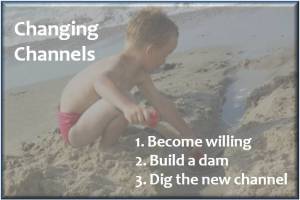 For many years after I joined the church my morning and evening prayers were 90% talking and 10% listening, if that. They went something like this:
For many years after I joined the church my morning and evening prayers were 90% talking and 10% listening, if that. They went something like this:
- Kneel at the side of the bed or couch.
- Open by addressing God, usually as “Heavenly Father.”
- Thank Him for what I am grateful for.
- Tell Him what I want to tell Him.
- Ask Him what I want to ask Him.
- Request what I want Him to do for me or a loved one.
- Close in the name of Jesus Christ, Amen.
- Get up and get on with my day, or into my bed.
I would do an abbreviated form of this during the day, if needed, usually one or more of steps 3 – 6.
As I heard more about getting “answers to prayers,” I started trying to hear or look for answers in my scripture reading, church meetings, and conference talks. I also hoped that somehow I would “hear” in my mind, direct answers.
At some point I realized that if I wanted to hear answers, it might make sense to listen for them(!), and I began waiting momentarily, after I said “amen,” to see if I could hear anything. When I actually did begin hearing the Lord answer my prayers, I began writing them, so that I could remember what He told me. I have written about this much more extensively in other posts.
Step Prayers
I want to suggest another kind of prayer, based on the 12 steps. These are prayers of humility that may or may not take the place of “normal” prayers. They help me see myself in my proper relationship to God, and help me internalize the principles of recovery. I take steps 1, 2, 3, 7, and 11 in these prayers. Then I just listen. God does most of the talking; I do most of the listening. Here is one example of what this might sound like:
Dearest Heavenly Father, I know that I, of myself, am powerless. Without you I am nothing. I know that you can and will manage my life effectively and help me to realize my full potential, if I let you. I turn my will and my life over to you today. Please remove my weaknesses and shortcomings if it is your will, and give me a new heart. Please help me to recognize and carry out your will in each moment. I pray in the name of Jesus Christ, Amen.
And then… I listen.
It takes less than a minute to say prayers like this, so I have plenty of time to listen. Instead of 90% talking and 10% listening, these prayers are 10% talking and 90% listening. Sometimes it just feels like the right way to connect with God.
- Can you see steps 1, 2, 3, 7, and 11 in my sample prayer?
- What percentage of your prayer time is spent talking as compared to listening?
- What are you willing to do today to improve your conscious contact with God?
Please share your thoughts about this post by commenting below.
Related Posts: Prayer, Meditation and Pondering, Tools: Quality Prayer














